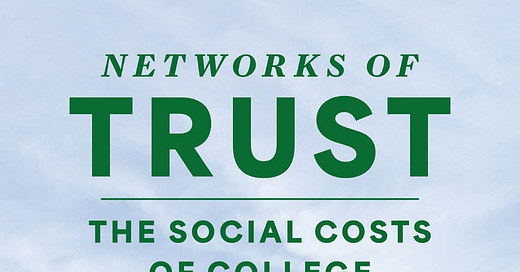New book alert!
Tony Laden’s new book, Networks of Trust: The Social Costs of College and What We Can Do about Them, is officially out.
It’s an insightful, accessible read — it’s what I’m (Carrie) gifting my dad this year, and it sparked a great conversation when someone spotted me reading it at a coffee shop last week.
There are a few passages ringing in my mind:
Being Attuned to Vulnerabilities
Environments can be safe without being coddling.
What is required to care for each student will be different, although some of the techniques for doing so may be the same. Note that making a space safe for these students does not require shielding them from any and all challenges to their views. It requires being attuned to the vulnerabilities they are being asked to accept in order to be in that space, and then thinking about whether there is a way to make those particular vulnerabilities acceptable to those students.
Students whose economic precarity makes it hard for them to devote sufficient time and attention to schoolwork are vulnerable in a different way than religious students who sign up for a philosophy class where morality is treated as wholly separate from religious authority.
… Environments can be safe without being coddling. People can be trustworthy and yet challenge what others do, say, and think. Indeed, this is what high-quality learning looks like. (p. 13-14)
The Dry Cleaner
We wouldn’t hand our shirts over to the dry cleaner on such terms!
When we entrust something we value to the care of another, we are vulnerable to loss and perhaps further harm. This is true even when we lend a book to a friend or leave our shirts at the dry cleaner. The person we trust might lose or damage what we have entrusted to them. They might fail to care for it properly in other ways.
Consider, then, how much more is at stake when parents entrust to schools and colleges the care of their children, and college students entrust to professors the development of their minds. Parents are expected not only to hand their children over to relative strangers, but to accept that the overall effect of this care will be to change their children in open-ended ways that can’t and won’t be specified in advance.
We wouldn’t hand our shirts over to the dry cleaner on such terms!
This form of vulnerability1 helps to explain why sending one’s children to school or college, or going to college oneself, can provoke anxiety, especially among those who have little or no experience of what happens in college. (p. 29-30)
Teaching, Indoctrination, and Trust
We’ve been working on a new podcast episode and an accompanying teaching guide about Tony’s book.
In the meantime, here’s an episode from 2021, when Tony was first starting to work on this project:
“If you think one of the things that is unsatisfying, to put it mildly, about political discussion in the US at the moment, is that it’s unengaged, that its sides just talk past each other, why is that? And how do we understand that? And is there a kind of diagnosis and description of that that might point us towards a different way of imagining what comes forward? And then taking the higher ed cases just as a local example of that bigger question.”
Wishing you all calm, clarity, and the right amount of snow as the semester comes to a close.
—CEE
New idea: In 2025, I want to pitch a collab between Tony and Brené Brown…




